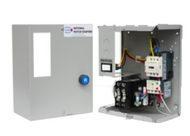The foundation of many electrical control solutions is motor controls, specifically motor starters. This is the first in a series of articles about motor starters. Through these articles you will gain an understanding of what is a motor starter, why we use motor starters, how a motor starter works, and the types of motor starters.
WHAT IS A MOTOR STARTER?
A motor starter is an electrical component designed to start and stop a motor safely. Like a relay, a motor starter switches power on and off and unlike a relay also provides overcurrent and low voltage protection.
A motor starter has four main functions:
- 1.Start a motor safely.
- 2.Stop a motor safely.
- 3.Reverse the direction of a motor.
- 4.Provide low voltage and overcurrent protection to the motor.
The motor starter is generally comprised of two components that work together to control and protect the motor.
- Electrical contactor: which starts and stops the power supply to the motor by making or breaking the contact terminals.
- Overload relay: which monitors the current for an overload condition.
National Motors Starters offers a complete line of both IEC and NEMA enclosed magnetic motor starters that meet the time demands of busy HVAC services companies, mechanical and electrical contractors and more. We approach every job with quality, flexibility, reliability and expertise offering more than 73,000 configurations for Enclosed NEMA and IEC magnetic motor starters. Take advantage of our quick ship starter visit our website https://nationalmotorstarters.com/quick-ship/

